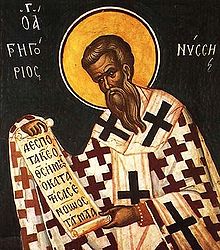Gregory of Nyssa
| Gregory of Nyssa | |
|---|---|

|
|
| Cappadocian Father | |
| Born | c. 335 Neocaesarea, Cappadocia |
| Died | c. 395 Nyssa, Cappadocia |
| Venerated in |
Eastern Orthodox Church Oriental Orthodoxy Roman Catholic Church Anglican Communion Lutheranism |
| Canonized | Pre-congregation |
| Feast | 10 January (Eastern Christianity) 10 January (Roman Catholicism and Lutheran Church Missouri Synod) 14 June, with Macrina (ELCA) 19 July, with Macrina (Anglican Communion) |
| Attributes | Vested as a bishop. |
Gregory of Nyssa, also known as Gregory Nyssen (Greek: Γρηγόριος Νύσσης; c. 335 – c. 395), was bishop of Nyssa from 372 to 376 and from 378 until his death. He is venerated as a saint in Roman Catholicism, Eastern Orthodoxy, Oriental Orthodoxy, Lutheranism, and Anglicanism. Gregory, his elder brother Basil of Caesarea, and their friend Gregory of Nazianzus are collectively known as the Cappadocian Fathers.
Gregory lacked the administrative ability of his brother Basil or the contemporary influence of Gregory of Nazianzus, but he was an erudite theologian who made significant contributions to the doctrine of the Trinity and the Nicene Creed. Gregory's philosophical writings were influenced by Origen. Since the mid-twentieth century, there has been a significant increase in interest in Gregory's works from the academic community, particularly involving universal salvation, which has resulted in challenges to many traditional interpretations of his theology.
The book of Acts depicts that on the Day of Pentecost there were visiting Jews who were "residents of...Cappadocia" in attendance. In the First Epistle of Peter, written after AD 65, the author greets Christians who are "exiles scattered throughout…Cappodicia." There is no further reference to Cappadocia in the rest of the New Testament.
...
Wikipedia
